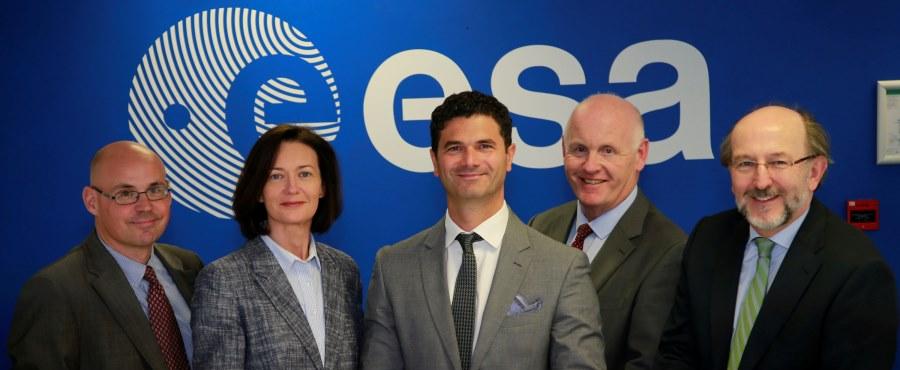Maker Space kicks off in Dublin

The European Space Agency (ESA) and Dublin City University have joined forces to establish a ‘Maker Space’ environment, which will support the development of innovative Machine-to-Machine (M2M) and Internet of Things (IoT) technologies for satellite communications.
Based at DCU Alpha, the University’s Innovation Campus, the initiative will provide opportunities for rapid prototyping and validation of challenging innovative technologies proposed by ESA and DCU, which are targeted at industry, space tech entrepreneurs, academics and the wider Maker movement stakeholders.
Potential applications of the investigated technologies will address challenges faced in everyday life. For example:
-
Adapt existing radio protocols and standards to integrate terrestrial communications with satellite communications;
-
Develop satellite enabled sensors which could aid in search and rescue operations;
-
Develop satellite enabled sensors to monitor critical infrastructure
ESA has awarded a contract to the Maker Space initiative through its ARTES Core Competitiveness programme. During the course of the project, which will run for up to eighteen months, various opportunities to undertake design and development technology challenges will be published by the Maker Space project to be awarded and implemented by target stakeholders via a competitive process. Maker Space activities will be 100% funded, ranging from €5,000 to €20,000 per activity .
“As Ireland’s University of Enterprise, DCU is looking forward to engaging with innovative Irish inventors, entrepreneurs, companies to develop new ideas and services in the field of satellite communications for M2M/IoT”, says Prof. Brian MacCraith, President of Dublin City University. “We hope to stimulate and support new innovations that can be further developed by Irish companies, with additional research and development support from DCU’s researchers in IoT, sensors and communications”.
“With modern satellite communications, many design challenges are unique, requiring testing and experimentation to reveal what does and does not work,” says ESA’s Frank Zeppenfeldt, Technical Officer for the activity. “For this reason, fast prototyping of promising technology concepts is absolutely essential. An additional goal is to encourage spin-in from terrestrial technology and convergence with satellite communication.”
“Through the Maker Space initiative, ESA aims to engage and work with a wide variety of parties with whom ESA has never worked to enable new ideas, boost innovative technologies and prepare for future satcom products,” he adds.
The demand for connectivity for what is anticipated will be up to 26 billion Internet of Things devices by 2020, will require both terrestrial and satellite communications. With the DCU-based Maker Space, ESA aims to accelerate research and development in this area in order to provide truly global communications satellite coverage for all such devices in the future.
In the coming months ESA will initiate a similar project to encourage fast prototyping in the area of Software Defined Radio.
For more information, visit the DCU Maker Space home page:



